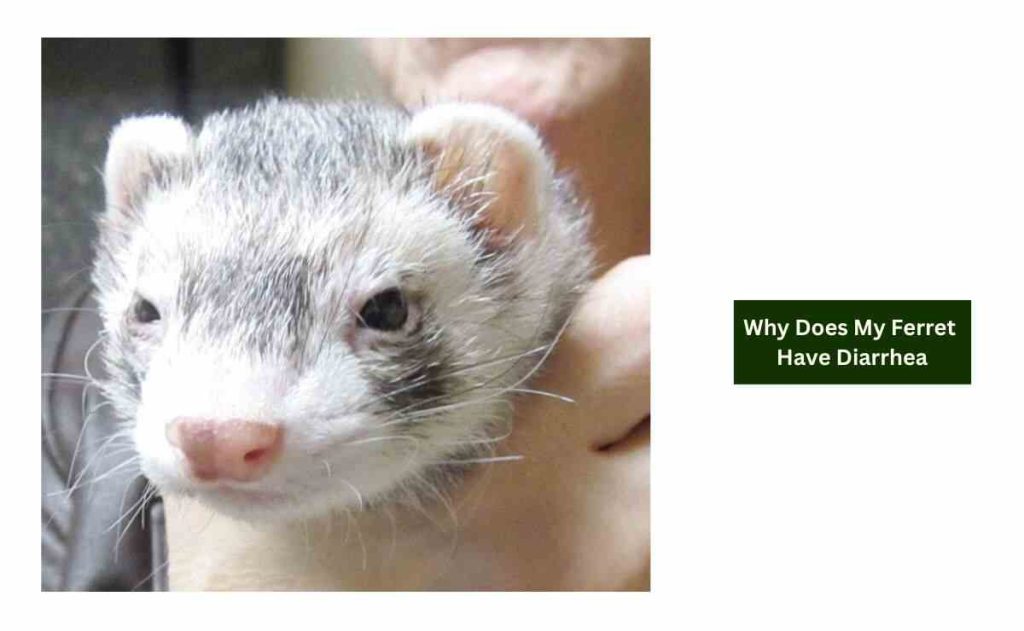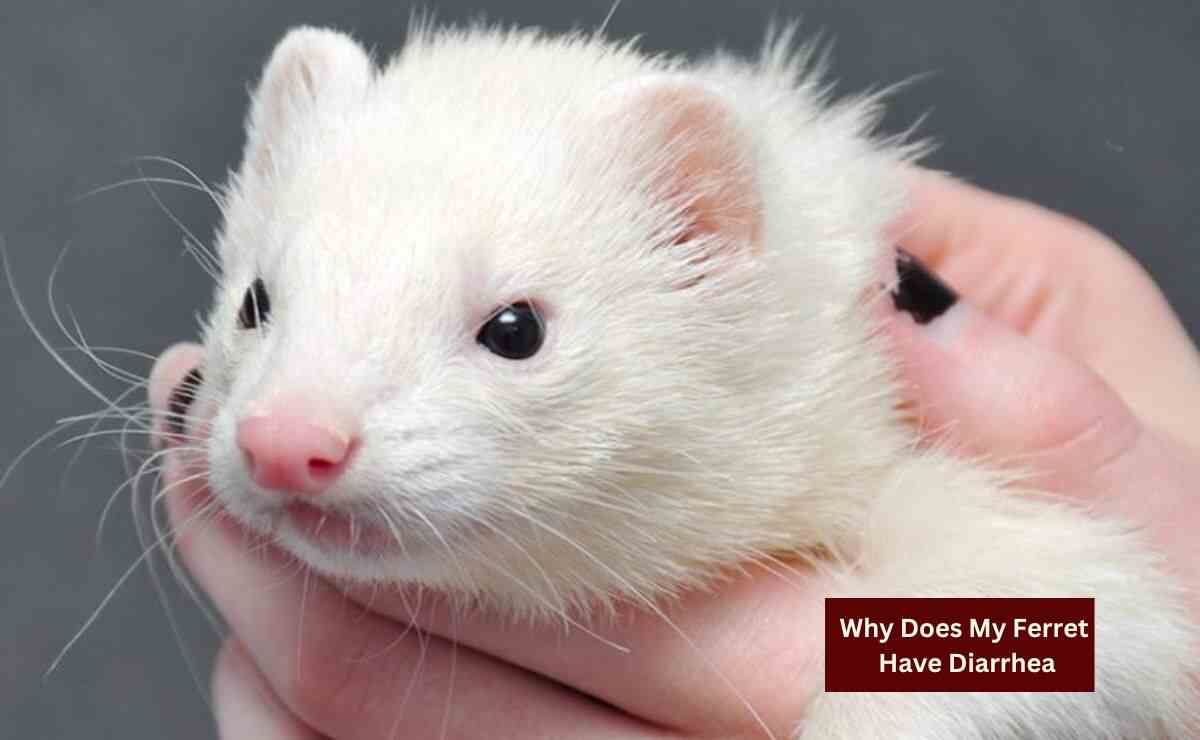Ferrets are popular pets for many reasons. They are playful, sociable, and can provide endless entertainment with their curious nature.
However, like any other pet, they can suffer from health problems from time to time. One of the most common conditions that ferret owners deal with is diarrhea. Diarrhea in ferrets is not only messy and unpleasant for both you and your furry friend but it can also indicate an underlying illness that needs attention.
There are several reasons why a ferret may develop diarrhea, ranging from mild to severe causes. In this article, we will explore some of the common triggers of diarrhea in ferrets and what you can do to help your pet recover quickly and comfortably.
Why Does My Ferret Have Diarrhea?

Diarrhea in ferrets is usually caused by a change in diet or an infection. If your ferret has recently eaten something new or different, this could be the cause of the diarrhea. In some cases, the diarrhea may be caused by an underlying medical condition such as pancreatic insufficiency or gastrointestinal parasites.
If you think that your ferret’s diarrhea is due to a dietary change, try returning to the original diet and monitoring their stool for any improvement. If there is no improvement after 24-48 hours, then it’s best to take your ferret to the vet for further investigation.
A veterinarian can perform a physical exam and run tests to determine if there is an underlying medical condition causing the diarrhea. Treatment will depend on the cause of the diarrhea but may include antibiotics or other medications, probiotics, and dietary changes.
How Long Does Ferret Diarrhea Last?
Ferret diarrhea typically lasts a few days, but can last up to a week. It is important to monitor your ferret’s health and behaviors during this time. If the diarrhea persists for longer than a week or your ferret begins to show signs of lethargy or loss of appetite, contact your vet immediately.
If you notice that your ferret has diarrhea, it is important to make sure they have plenty of fluids and electrolytes. You should also check their diet and make sure they are getting enough fiber and other nutrients.
If necessary, you can supplement their diet with probiotics or fiber supplements. In some cases, antibiotics may be prescribed by your vet if the cause of the diarrhea is bacterial in nature.
It is also important to keep their litter box clean and free from any fecal matter that could further spread infection throughout the home.
What Does Unhealthy Ferret Poop Look Like?
Unhealthy ferret poop can vary in appearance, but there are some common signs to look out for. If your ferret’s stool is black or tarry, this could indicate internal bleeding and should be checked out by a veterinarian immediately.
Other signs of unhealthy poop include diarrhea, constipation, and an unusually foul smell. If the consistency of your ferret’s stool changes significantly from one day to the next, it could be a sign that something is wrong.
You should also pay attention to how often your ferret is pooping. Healthy ferrets usually defecate several times a day, so if you notice a decrease in frequency or volume this could be another sign of an underlying health issue.
Also, if your ferret has difficulty passing stool or appears to strain when going to the bathroom, this could indicate a blockage and should also be checked out by a vet right away.
Can Stress Cause Diarrhea in Ferrets?
Yes, stress can cause diarrhea in ferrets. This is because stress and depression causes the digestive system to work harder than normal and can lead to loose stools. Stress-related diarrhea is more common in ferrets than other animals because they are highly sensitive to changes in their environment.
In addition to environmental changes, other factors that may contribute to stress-related diarrhea in ferrets include changes in diet, a new pet or family member, loud noises, or overcrowding. To reduce the risk of stress-induced diarrhea, it’s important to keep your ferret’s environment as consistent and comfortable as possible.
Make sure you provide plenty of hiding places for them and avoid making sudden changes to their diet or living space. Additionally, regular vet visits can help detect any underlying medical conditions that may be causing the diarrhea.
How to Prevent A Ferret from Getting Diarrhea?
The best way to prevent a ferret from getting diarrhea is to provide them with a well-balanced diet. Feed your ferret a high-quality, nutritionally complete and balanced diet that is specifically formulated for ferrets. Avoid feeding them table scraps or too many treats as this can lead to digestive issues.
It is also important to make sure that your ferret has access to plenty of fresh, clean water at all times. Dehydration can cause diarrhea in ferrets so it’s important that they stay hydrated. If you notice that your ferret isn’t drinking enough water, consider adding some wet food or low-sodium broth to their diet.
Finally, it is essential to keep your ferret’s living environment clean and free of any bacteria or parasites that could cause digestive problems. Clean the litter box regularly and make sure your pet has plenty of space to run around and exercise daily.
How to Treat A Ferret with Diarrhea?
Diarrhea in ferrets can be a sign of a serious illness, so it’s important to take your pet to the vet as soon as possible. In the meantime, there are some steps you can take to help treat your ferret’s diarrhea.
First, make sure your ferret is hydrated. Offer them plenty of fresh water and electrolyte solutions like Pedialyte or Gatorade. You may also want to give them canned pumpkin or other fiber-rich foods to help firm up their stool.
Lastly, monitor your ferret’s diet and environment for any potential causes of diarrhea such as stress, changes in diet, or exposure to toxins. If you identify any triggers, try to remove them from your ferret’s environment and adjust their diet accordingly.
With proper care and treatment from a veterinarian, your ferret should recover quickly from diarrhea.
Conclusion
Diarrhea is a common issue for ferrets that can have a variety of causes ranging from dietary changes to serious health conditions. Ferret owners should monitor their pet’s bowel movements and take note of any unusual symptoms such as lethargy or loss of appetite.
It is important to seek veterinary care if your ferret experiences persistent diarrhea as it can lead to dehydration and other complications.
Providing a balanced diet, avoiding sudden food changes, and keeping their environment clean can help prevent diarrhea in ferrets. By being attentive to your ferret’s needs, you can keep them healthy and happy for years to come.
